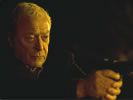Eye For Film >> Movies >> Harry Brown (2009) Film Review
There are moments when Harry Brown stands out as one of the boldest, most powerful British gangster films in recent memory. From the outset there is a sense of relevance here. The opening scene, filmed from a camera-phone first person point of view, sees two tearaway teens senselessly shoot a young mother before meeting a sticky end as they make their getaway. It is a harrowing moment, and a precursor of the film's unashamed abrasiveness.
After losing his wife to a long illness, Harry Brown (Michael Caine) realises that he no longer has a place in the world around him - an estate where drug dealers and ASBO adolescents rule. Dismayed by a society decaying before him, Harry finds solace in the form of best friend Leonard (David Bradley), who echoes his yesteryear griping. But when Leonard decides to take a stand against the aggressors, he is brutally murdered, leaving Harry alone, heartbroken and vengeful.

Like an OAP John Rambo, Harry tracks down and dispatches the culprits with ruthless instinct and merciless ferocity. While an all-action eighty-something vigilante might sound a bit far-fetched, Harry’s ex-marine credentials are enough to make this a plausible narrative turn. This is Caine’s finest, grittiest performance in years and there are few actors of his stature who could pull off such a role so compellingly.
Like Clint Eastwood’s Korean War vet Walt in Gran Torino, Harry is stripped down to the most primal of human emotions. In these moments of insecurity, vulnerability and fragility, Harry becomes more than just a reckless retiree and his antagonistic actions are justified. While Caine’s no-nonsense heroics will captivate, however, this is ultimately a single-minded affair, manipulating and twisting its way around audience heartstrings with unremitting sentimentality. The wrongdoers are clearly marked, and perhaps rightly so, but given such an execrable voice it is easy to forget that most of them are, ultimately, children. They are part of what has become a somewhat lost generation, yet in this council block context they compose a majority. Harry’s actions, therefore, offer little solution to the greater social ills examined so purposefully at the beginning.
Barber may well deliver action in spades and the pace is proficient enough, but somewhere along the line he looses sight of the film's anti-establishment agenda. After raising awareness of some tough social issues Barber’s Broken Britain bandwagoning becomes somewhat tiring, and the director increasingly substitutes style for substance. Perhaps he just isn’t taking himself too seriously here, but then why the punchy crescendo-laced score? Why the fire and brimstone finale? That said, there are several scenes where the director’s attention to detail creates an intense, almost tortuous atmosphere – most notably when Harry visits a local crack den to purchase a gun.
This is a far from responsible film and, save the honourable inclinations of DI Frampton (Emily Mortimer), whose by-the-book philosophy is actually rather annoying, there is little principle here. Even Harry isn’t entirely virtuous. The forlorn figure of a lonely old man is sure to evoke sympathy, but while his guns blazing brashness certainly settles the score; the films excessiveness will leave you lost and in the end cold to Harry’s cause.
Reviewed on: 08 Nov 2009





















